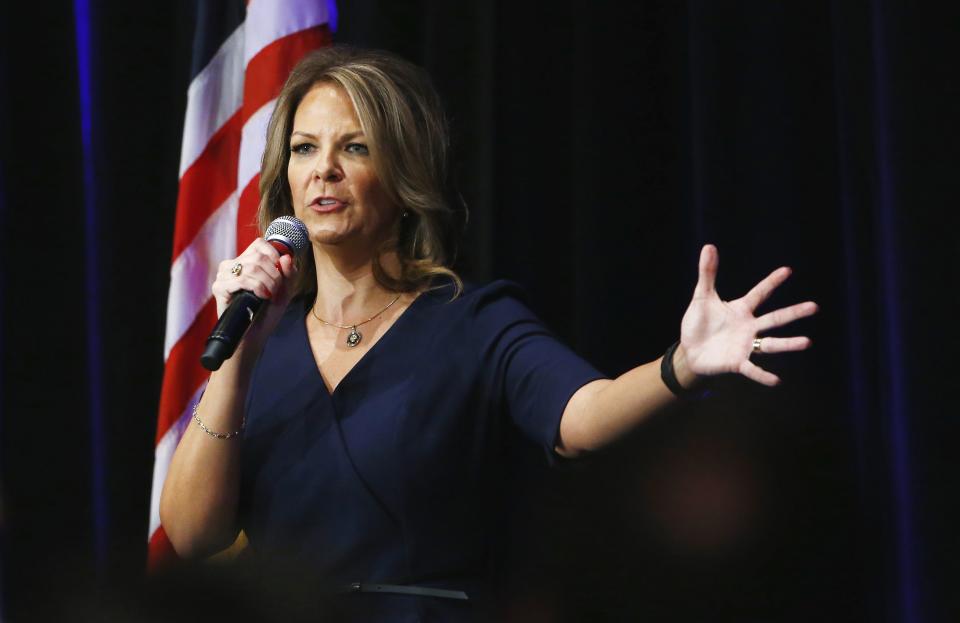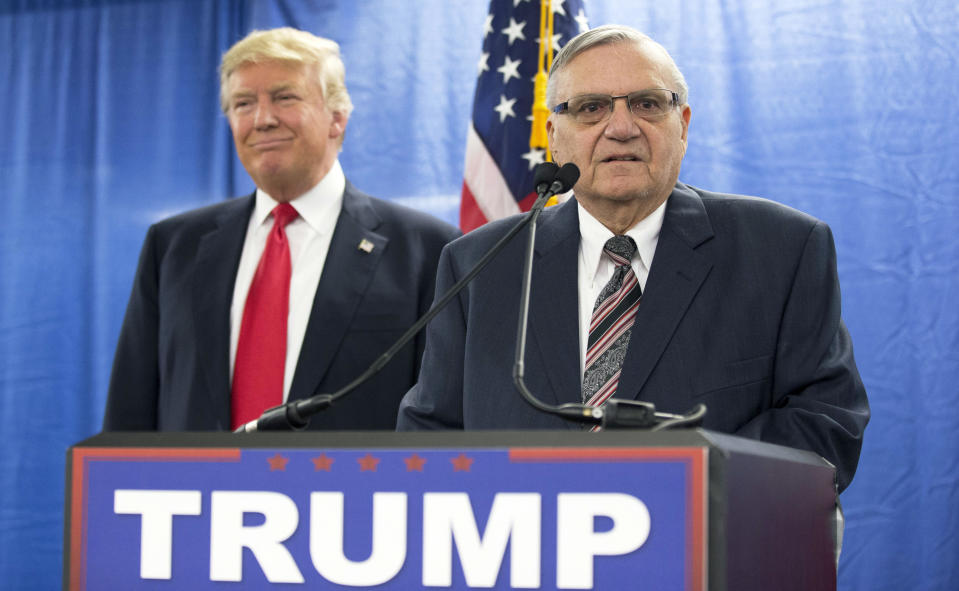Trump looms large in Arizona Senate race to replace Jeff Flake

It may be 2018’s marquee Senate race.
But the battle for Arizona’s open U.S. Senate seat — one of two prime Democratic pickup opportunities — could do more than decide control of the world’s greatest deliberative body, where Republicans currently rule by a single, precarious vote.
It could also answer this cycle’s most pressing political question: How do candidates from both parties solve a problem like Donald Trump?
The contenders vying to replace retiring Republican senator Jeff Flake are all characters in their own right. On the GOP side, there’s a fighter-pilot-turned-congresswoman (Rep. Martha McSally), an osteopath-turned-right-wing-rabble-rouser (former state Sen. Kelli Ward) and America’s most notorious immigration hardliner (former Maricopa County Sheriff Joe Arpaio). And on the left, the likely Democratic nominee, Rep. Krysten Sinema, is not only the first openly bisexual member of Congress, she’s also the most bipartisan Democrat in the House.
As they jockey for advantage, all of these candidates are positioning themselves vis-à-vis Trump in ways that defy national assumptions, making the contest a counterintuitive — and revealing — testing ground, where the new realities of running for office in the Age of Trump are being worked out in real time.
At first, the Republican primary contest seemed to pose a fairly straightforward question: Did Flake’s brand of traditional movement conservatism — limited government, muscular internationalism, Christian moralism — still have a place in the Republican Party, or was Trump’s brash, amoral, “America First” approach now the future of the GOP?
When Flake, a vocal Trump critic, bowed out last October — polls showed he could not defeat Ward, his resolutely pro-Trump opponent — the question seemed to be settled.

It wasn’t until Ward attracted two challengers of her own in early 2018 that a new narrative began to emerge.
The first to announce was Arpaio. If Ward aspires to be Trump in miniature — she endorses his entire agenda, from building the border wall to halting Muslim immigration to repealing Obamacare to ending sanctuary cities — then Arpaio promises to out-Trump Trump himself.
A former U.S. Army soldier, police officer and DEA agent, Arpaio, 85, is most famous for his incendiary 24-year tenure as America’s self-styled “toughest sheriff.” During that time he made headlines with his round-’em-up immigration raids (which contributed, according to the Justice Department, to the worst pattern of racial profiling in U.S. history), his brutal, self-described “concentration camp” Tent City (which was designed to alleviate prison overcrowding), and his refusal to investigate alleged child sex crimes.
Since launching his Senate bid in January, Arpaio has not moderated his politics one iota. “I don’t see any cops in the Senate,” he said during a recent appearance in Nashville. “They’re all lawyers, politicians. It’s time to get a law enforcement guy. The right one.”
Arpaio seems convinced that his path to victory runs to the right of Ward — and even Trump. The president, for instance, has insisted that he wants to protect so-called Dreamers, people who immigrated illegally to the U.S. as children. Arpaio says they should be deported. And while Ward and even Trump, a former birther himself, have both affirmed that Barack Obama was, in fact, born in the United States — “He was our legitimate president,” Ward said in January — Arpaio has hinted that he would revive his groundless crusade to discredit Obama’s birth certificate if elected.
“I don’t talk about it anymore, until I become a U.S. senator,” Arpaio told a group of supporters at the Western Conservative Conference in Phoenix last month. “So, I’m kind of dropping that right now. But, I’m going to tell you something — 100 percent, we proved that’s a fake document.”

A few days after Arpaio threw his hat in the proverbial ring, Rep. Martha McSally, AZ-2, joined him. The early thinking was that she would corner the more mainstream Republican vote, leaving Arpaio and Ward to squabble over right-wing scraps.
To a certain degree, that’s what she seems poised to do. One of the highest-ranking female pilots in Air Force history, with a master’s degree from Harvard to boot, McSally has twice won her Tucson-area swing district, even as Trump lost there to Hillary Clinton. She is the clear favorite of D.C. Republicans (such as Sen. Majority Leader Mitch McConnell) and conservative donors (such as the Koch brothers).
But what’s most striking so far about McSally’s run is not how different she sounds than her die-hard pro-Trump opponents. Instead, it’s the deliberate effort she’s been making to sound more like them — despite her well-documented history of skepticism toward, and even frustration with, the president.
McSally never endorsed Trump in 2016. She opposed his plan to stop Muslims from entering the United States, and she condemned his threat to ditch NATO. When Trump was caught on tape bragging about grabbing women’s genitals, she called the comments “disgusting” and “unacceptable.” Asked whether she eventually gave in and voted for the GOP nominee, McSally refused to answer. “Not your business,” she snapped. Last summer, the congresswoman told donors that Trump was making her life more difficult. “All of a sudden on January 20, I’m like his twin sister,” she said. “I’m, like, responsible for everything he does, and tweets, and says. We’re doing the best we can through the minefield that we have to navigate with a tremendous amount of distractions out there.” And during a 2017 town hall, McSally described the early weeks of Trump’s tenure as “tremendously bumpy.”
“Some of their decisions and the way they have implemented them have certainly not been well coordinated,” she said of the Trump administration. “I’m concerned about not shifting from campaigning to governing.”
Now, however, McSally, 52, is portraying herself as yet another Trump loyalist. She has sent distributed photos of herself with the president and with first daughter Ivanka Trump, and has appeared on Fox News to sing the president’s praises. Meanwhile, McSally’s debut campaign ad “rebrands the GOP establishment favorite as a hard-ass conservative who hates liberals, the establishment, political correctness, and Sharia law, while all but claiming she is Trump’s own candidate in the race,” as New York magazine’s Ed Kilgore recently put it.
“My friend Martha McSally, she’s the real deal,” Trump says onscreen. “She’s tough.”
“Like our president, I’m tired of PC politicians and their BS excuses,” McSally adds. “I’m a fighter pilot, and I talk like one.”
In recent interview with the New York Times, McSally went so far as to claim that Trump is role model who has “done a lot of amazing things in his life.”
“Sure, absolutely,” she said when asked if she would campaign with Trump in the general election. “I have a great relationship with the president.” (According to reports, Trump will effectively boost McSally’s chances by declining to endorse in the primary, even though Ward was an early supporter and Arpaio received Trump’s first presidential pardon.)
McSally’s embrace of Trump extends to policy as well. Throughout 2016 and 2017, she offered qualified support of increased border-security measures, but stopped well short of backing Trump’s “wall.”

“When it comes to barriers, they are important where appropriate, but only part of the equation,” she said in January 2017. “What we need is a comprehensive strategy to grow situational awareness, build operational control and dismantle the cartels and their networks.”
“Not a continuous, 2,000-mile border wall, no,” she added during a town hall with constituents the following month.
But now McSally insists that she has “always supported building a wall” — a clear shift from her earlier, more nuanced position.
The Trumpification of Martha McSally is born of the fact that GOP primary voters still adore Trump, and in Arizona, they’ve always demanded a particularly hard line. Even Sen. John McCain, a longtime proponent of comprehensive immigration reform, barked about “complet[ing] the danged fence” in a 2010 primary ad.
But it’s also worth noting that unlike, say, Utah, Arizona is no longer a reliably red state. In 2012, Mitt Romney won there by 9 percentage points; four years later, Trump only managed to squeak past Hillary Clinton by 3. The broader population looks less and less like the aging, lily-white GOP primary electorate, and it is increasingly dominated by two groups that especially dislike Trump: moderate, well-educated suburbanites clustered in the booming Phoenix metropolitan area, and Latinos, who now represent a fast-growing 31 percent of the state’s residents.
As a result, Gallup recently found that Trump’s statewide approval rating is underwater, with 53 percent disapproving of his performance and only 41 percent approving. Veering to the right to align yourself with a president that unpopular among your would-be constituents is a risky strategy — particularly when one of the country’s latest primaries (Aug. 28) doesn’t give you much time to pivot back to the center.
Which brings us to McSally’s likeliest Democratic opponent, Krysten Sinema, a three-term U.S. congresswoman, lapsed Mormon, openly bisexual and nontheist trailblazer and Ironman triathlete. With an impressive $5.1 million on hand, Sinema is widely considered the early frontrunner to succeed Flake.
On paper, Sinema seems like a progressive hero, and indeed, that’s what she once aspired to be, writing in a letter published by the Arizona Republic that “until the average American realizes that capitalism damages her livelihood while augmenting the livelihoods of the wealthy, the Almighty Dollar will continue to rule.” (She also called herself a “Prada socialist.”)
But in Congress, Sinema has carved out a uniquely bipartisan record — she has voted with Trump 56.7 percent of the time, more often than all but two other Democrats — and as a Senate candidate she has made it clear that she will be campaigning in a manner that seems to clash dramatically with the prevailing view among progressives: namely, that if Democrats want to win back Congress, and eventually the White House, they should disregard America’s dwindling centrist bloc and focus instead on harnessing their own voters’ righteous anger at Trump.

Trump is “not a thing,” Sinema insisted when the Arizona Republic asked about her message. “[He’s] not a part of what I think my constituents are worried about or think about.”
Nor, she added, is partisanship. “It’s not about a party,” Sinema said. “It never is about party. It’s about putting people ahead of party. I don’t think party matters much to people.”
More recently, Sinema told the New York Times that she and Trump “worked together very well” on veterans’ issues and sidestepped questions about his character.
“I mean, I’m happy to work with anyone at any time,” she said.
This sort of “No Labels” talk has a long history on the campaign trail, and with no major primary competition, Sinema has the luxury of targeting the moderate voters that McSally & Co. are ignoring: independents and suburban, college-educated Republicans who are turned off by Trump but aren’t particularly turned on by the resistance.
Ultimately, then, the bet Sinema is making isn’t all that different from McSally’s.
On the right, Arizona will test how closely down-ticket Republicans can afford to cling to their historically unpopular president without repelling middle-of-the-road general-election voters.
And on the left, it will demonstrate how far moderate Democrats can go in resisting the anti-Trump “resistance” without squandering what could be their greatest asset in November: a highly motivated base. Sinema’s assumption is that while Arizona progressives may be unsatisfied, they won’t really refuse to show up and vote in the one contest that could, more than any other, help them achieve their existential goal of halting Trump’s agenda in its tracks.
The irony is that if McSally winds up winning the GOP nod and joining Sinema in the center, the general election could become an essentially Trumpless battle. Despite our national fixation with the disrupter in chief, Arizona might reveal a surprising new on-the-ground reality: that in the very closest contests, where the middle matters most, both parties are better off simply pretending Trump doesn’t exist.
Sinema’s advantage may be that while McSally has to hug the president tighter and tighter, she gets to start ignoring him right now.
Read more from Yahoo News:



